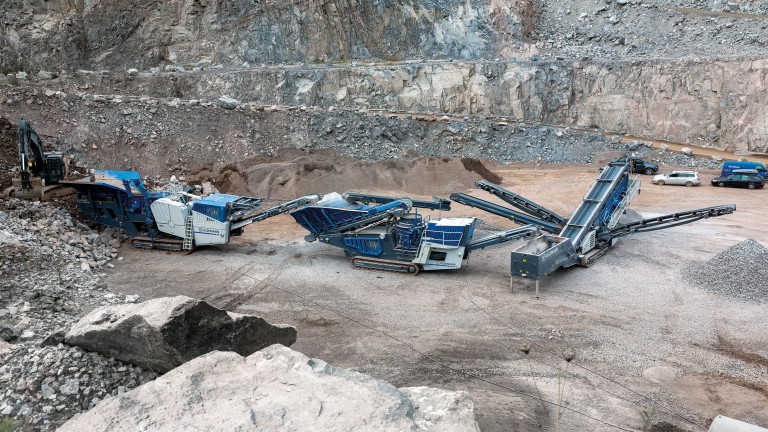All-electric mobile crushing and screening plants offer a sustainable alternative to traditional diesel-powered equipment, significantly reducing on-site carbon dioxide emissions. These plants are becoming increasingly important in the construction and demolition (C&D) and mining industries where low-emission solutions are in demand.
While the initial investment for electric equipment is generally higher than that of its diesel counterparts, companies can benefit from long-term cost savings through reduced fuel consumption.
The initial cost of the machine can also be recovered in approximately six years — even as soon as four years if it’s powered by solar panels or a photovoltaic (PV) system. This makes electric-powered equipment a cost-effective choice for operators looking to stay competitive in a sustainability-driven market.
Powered by renewable resources
Tobias Böckle, head of product management at Kleemann, explains that a typical mobile plant set up — a jaw crusher (MOBICAT MC 120 PRO), a secondary cone crusher (MOBICONE MCO 110 PRO), and a screening machine (MOBISCREEN MSC 953 EVO) — consumes around 77 litres of diesel per hour.
The electric version of the plant uses about 302 kW per hour, with a maximum power demand of 542 kW. Böckle emphasizes that the energy supply should ideally come from renewable sources, such as the site’s own solar panels or PV system.
“Electrical operation becomes a climate-friendly, cost-efficient concept in just a few years, which not only provides the operating company with monetary benefits but also reflects its efforts towards greater sustainability,” adds Böckle.
Comparing diesel vs. electric-powered aggregate processing plants
The C&D and mining industries are witnessing a significant shift towards electric-powered aggregate processing plants, driven by the need for reduced emissions, lower operating costs, less maintenance, and improved safety.
Diesel-powered plants have been the traditional choice for aggregate processing, but these machines come with significant drawbacks: they emit high levels of greenhouse gases, contribute to climate change, and require regular maintenance to ensure optimal performance.
In contrast, electric-powered plants offer a cleaner and more efficient alternative, as well as offering a competitive edge by enabling emissions-free operations in areas where stringent emissions standards apply. Electric plants also enhance safety by eliminating the risks associated with handling and storing diesel fuel.
Electric-powered plants offer long-term savings
Electric-powered plants, though initially more expensive due to specialized equipment, transformers, and cable requirements, provide significant long-term savings. By reducing reliance on fossil fuels, companies benefit from more stable energy costs, especially when paired with renewable energy sources.
On the flip side, diesel-powered aggregate processing plants require minimal infrastructure investment beyond fuel costs, which vary by region. Savings from switching to electric plants depend largely on the price difference between diesel and electricity in the operating area.
Battery swapping systems and quick recharge capabilities are key
In locations with limited infrastructure, electric plants can operate in combination with renewable energy sources. Battery swapping systems — where a depleted battery is replaced with a fully charged one — can further enhance the efficiency of electric plants. Quick recharge capabilities are also essential for maintaining productivity.
Notably, Kleemann’s electric plants can also be run autonomously using sustainable HVO diesel, providing flexibility and further reducing environmental impact.
Read the full article here

